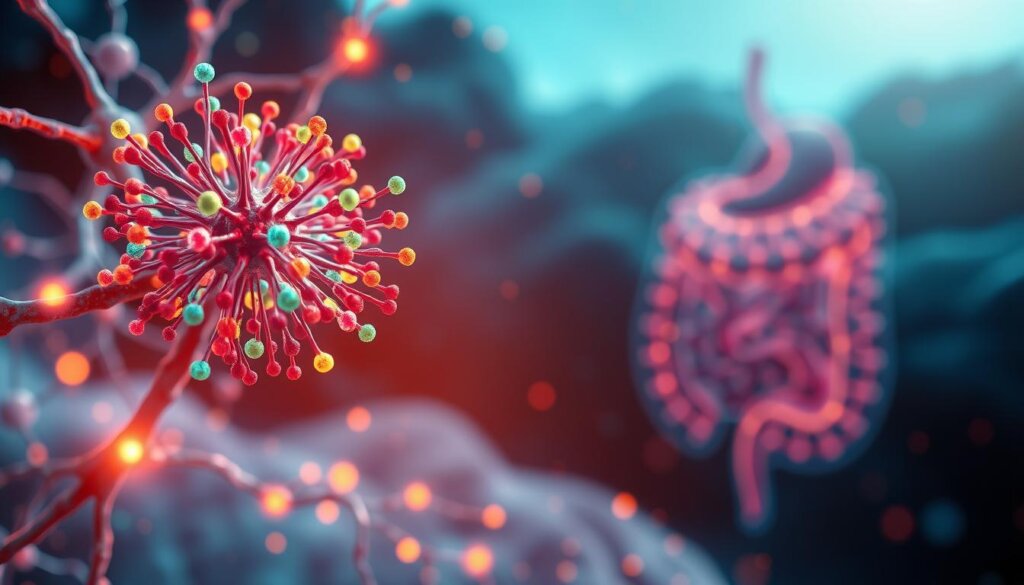What if balancing your gut could transform your emotional well-being? Emerging science reveals a fascinating connection between digestive bacteria and brain function, challenging traditional approaches to mood support.
Over 300 million adults worldwide experience depression, while anxiety impacts nearly 1 in 5 Americans annually. As conventional treatments remain essential, researchers now explore how specific bacterial strains might complement existing therapies. Wellness Group’s latest analysis of recent studies highlights promising developments in psychobiotics – specialized microorganisms showing potential mood-regulation properties.
The gut produces over 90% of the body’s serotonin, a key neurotransmitter influencing emotional balance. This biological link explains why scientists investigate strains like Lactobacillus and Bifidobacterium for their role in the microbiota-gut-brain axis. While not replacements for medical care, these discoveries offer new avenues for holistic wellness strategies.
Key Takeaways
- The gut microbiome directly communicates with the brain through the nervous system and hormones
- Depression and anxiety rates highlight the urgent need for complementary support options
- Psychobiotics represent a new frontier in microbiome-based mental wellness research
- Specific bacterial strains show unique mechanisms for supporting emotional balance
- Wellness Group validates approaches through clinical evidence and safety analysis
Understanding Probiotics and Mental Health
Imagine your gut as a bustling city where friendly microbes work around the clock. These live microorganisms, known as probiotics, naturally inhabit your digestive tract. They act like microscopic guardians, maintaining harmony between beneficial and harmful bacteria.
What Are Probiotics?
Probiotics thrive in fermented foods like yogurt, kimchi, and tempeh. Supplements also deliver concentrated doses of these helpers. When consumed regularly, they support digestion and nutrient absorption while crowding out undesirable microbes.
The Gut-Brain Axis Connection
Your gastrointestinal tract and central nervous system constantly exchange messages through the gut-brain axis. This biological communication highway uses nerve signals and chemical messengers like serotonin. Nearly 80% of immune cells reside in the gut, linking microbial balance to whole-body wellness.
Think of this axis as a two-way radio between your belly and brain. Emotional stress might trigger digestive discomfort, while an imbalanced microbiome could influence mood patterns. Research shows specific bacterial strains may produce compounds that support cognitive function and emotional resilience.
How do probiotics help mental health?
The secret to a calmer mind might lie in the bustling world of your intestines. Beneficial bacteria actively shape emotional well-being through biochemical conversations with the nervous system. These microscopic allies produce compounds that travel along the gut-brain axis, influencing everything from daily stress resilience to nighttime restfulness.

Mechanisms Affecting Mood and Sleep
Certain strains generate mood-regulating chemicals like serotonin and GABA directly in the gut. Nearly 50% of dopamine production occurs here too. This microbial activity may help stabilize circadian rhythms, promoting deeper sleep cycles. Better rest quality often leads to improved emotional balance during waking hours.
These microorganisms also influence appetite signals and nutrient absorption. Balanced eating patterns support steady energy levels, which can affect daily mood fluctuations. Research suggests specific strains might reduce cortisol spikes after stressful events.
Impact on Inflammation and Cognitive Function
Chronic inflammation has been linked to depressive symptoms in multiple studies. Probiotics strengthen intestinal barriers, preventing harmful substances from triggering body-wide inflammation. A healthier gut lining means fewer inflammatory markers reaching the brain through the bloodstream.
Enhanced microbial balance supports clearer thinking and faster decision-making. Studies show improved memory recall in individuals maintaining diverse gut flora. Regular probiotic use may help maintain mental sharpness during demanding tasks or high-pressure situations.
Probiotics, Gut Health, and Overall Wellness
A thriving gut ecosystem does more than process food—it forms the bedrock of physical and emotional vitality. When beneficial bacteria flourish, they create ripple effects that extend far beyond the digestive tract.
Influence on Digestive Health
Probiotics act like microscopic gardeners in the intestines. They crowd out unwanted pathogens by occupying space and resources, much like weeds get choked out in a well-tended flowerbed. This balancing act supports smoother digestion and reduces bloating or irregularity.
These friendly microbes strengthen the gut lining—a protective barrier that acts as your body’s security team. A robust intestinal wall prevents harmful substances from entering the bloodstream while allowing nutrients to pass through. Studies show this selective filtering directly impacts systemic inflammation levels.
| Probiotic Function | Physical Benefit | Mental Wellness Link |
|---|---|---|
| Produce short-chain fatty acids | Nourish gut cells | Reduce brain inflammation |
| Enhance nutrient absorption | Better vitamin uptake | Support neurotransmitter production |
| Boost immune cell activity | Fewer infections | Lower stress hormone levels |
Improved digestion often leads to better nutrient delivery to the brain. Essential compounds like tryptophan and B vitamins become more available, aiding the creation of mood-regulating chemicals. This explains why many report sharper focus and emotional stability after addressing gut issues.
About 80% of immune cells reside in the gut, making microbial balance crucial for defense. Probiotics stimulate these cells while producing natural antibiotics against invaders. A balanced microbiome offers three key health: stronger immunity, efficient digestion, and systemic inflammation control—all factors influencing mental clarity.
Evidence-Based Research on Probiotics and Mental Health
Groundbreaking studies uncover how microscopic allies in the gut might influence emotional wellness. Rigorous clinical trials and meta-analyses now validate what researchers observed in early experiments—specific bacterial strains show measurable effects on mood patterns.

Clinical Trial Overviews
A 2017 trial with 44 irritable bowel syndrome patients revealed promising results. Those receiving Bifidobacterium longum NCC3001 reported better quality of life and reduced depression scores over 10 weeks compared to placebo groups.
Another pivotal study tracked individuals with major depressive disorder for eight weeks. Participants using a three-strain supplement saw significant improvements on the Beck Depression Inventory—a standard assessment tool. Double-blind designs in these studies help rule out placebo effects.
Review of Scientific Literature
A 2017 analysis of 10 human trials found consistent mood support benefits. Daily supplementation correlated with reduced anxiety symptoms and milder depressive episodes across diverse populations. Researchers particularly highlight Lactobacillus and Bifidobacterium strains for their neurotransmitter-modulating capabilities.
While current evidence remains limited by small sample sizes, the probiotic role in the body continues gaining scientific credibility. Ongoing studies explore optimal dosages and strain combinations for targeted support.
Practical Tips and Wellness Group Expertise
Navigating the world of gut-friendly solutions can feel overwhelming. Wellness Group simplifies this journey with science-backed strategies tailored for emotional and digestive harmony.
Smart Supplement Strategies
Clinical studies highlight Lactobacillus and Bifidobacterium strains as top performers for mood support. When choosing supplements:
- Check labels for 10-40 billion CFU counts
- Confirm third-party testing seals
- Follow dosage instructions precisely
More isn’t always better – excess amounts won’t boost results. Temporary stomach adjustments like mild bloating often resolve within 72 hours as your system adapts.
Delicious Dietary Upgrades
Boost your meals with fermented foods that naturally support gut health:
- Add kimchi to rice bowls
- Mix miso into salad dressings
- Top oatmeal with probiotic yogurt
Start with small portions to let your digestive system adjust gradually. These tasty swaps may also enhance nutrient absorption from other meals.
Personalized Support Options
Wellness Group’s team offers tailored guidance through WhatsApp (+60123822655). Available Monday-Friday 9:30am-6:30pm and Saturday 10am-5pm, their experts help navigate:
- Supplement interactions with medications
- Immune system considerations
- Long-term maintenance plans
Sunday closures ensure staff recharge to provide fresh insights each week. For those managing specific syndromes, personalized consultations address unique needs while maximizing safety.
Conclusion
Emerging science continues to reshape our understanding of emotional wellness through microbial balance. Studies like those in recent clinical trials demonstrate measurable improvements in mood patterns, with specific bacterial strains reducing anxiety and depressive symptoms. These findings highlight the gut’s role as a biological command center for both physical and emotional resilience.
Maintaining a thriving gut ecosystem supports whole-body health, from sharper cognitive function to balanced inflammation responses. For older adults, targeted approaches like those discussed in digestive wellness strategies show how personalized solutions can address multiple concerns simultaneously.
While research evolves, current evidence confirms that nurturing gut flora remains a valuable complement to traditional care. As science uncovers more about microbial interactions, holistic approaches integrating diet, supplements, and lifestyle will likely play expanding roles in emotional well-being strategies.
FAQ
Can gut health influence anxiety or depression?
Research suggests the gut-brain axis plays a key role in emotional well-being. Beneficial bacteria in the digestive tract produce neurotransmitters like serotonin, which regulates mood. Studies show imbalances in gut microbes may contribute to stress responses linked to anxiety and depressive symptoms.
What digestive issues are tied to mental health concerns?
Conditions like irritable bowel syndrome (IBS) often coexist with anxiety or sleep disturbances. Inflammation caused by poor gut function can affect cognitive performance and emotional stability. Addressing microbial balance through probiotic-rich foods or supplements may support both digestive and psychological wellness.
How do probiotics interact with the nervous system?
Certain strains communicate with the central nervous system via the vagus nerve, modulating stress hormones like cortisol. Clinical trials indicate specific probiotics reduce inflammation and improve neurotransmitter activity, potentially enhancing mental clarity and relaxation over time.
Are there evidence-based benefits of probiotics for brain function?
A 2023 review in Nutritional Neuroscience highlighted strains like Lactobacillus and Bifidobacterium improving memory and focus in participants. These microbes may protect against oxidative stress in neural pathways, supporting long-term cognitive health when paired with a balanced diet.
What lifestyle factors boost probiotic effectiveness?
Combining supplements with fiber-rich foods, regular exercise, and quality sleep optimizes gut diversity. Experts recommend consulting healthcare providers to choose strains backed by clinical research, ensuring alignment with individual needs like IBS management or mood regulation.






